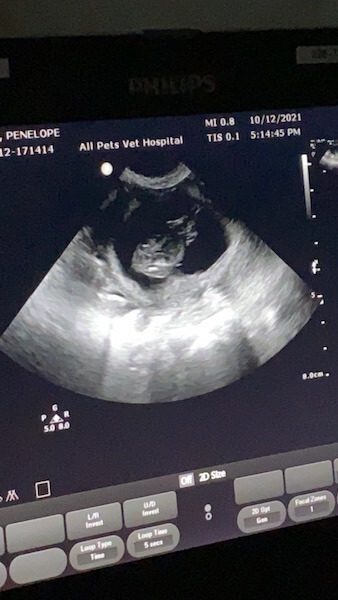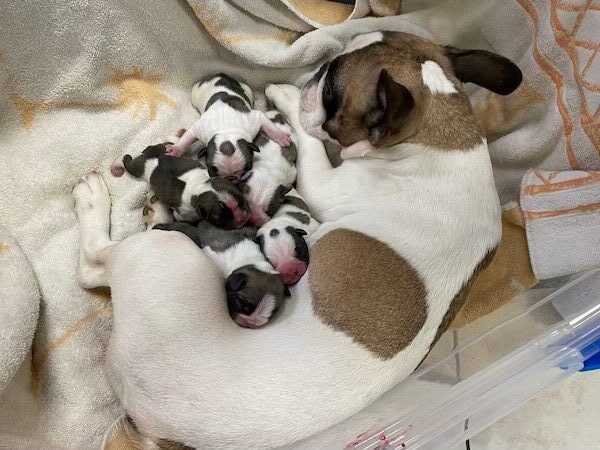How Long is a Dog Pregnant? A Guide to Canine Gestation
When your dog is expecting puppies, it’s natural to have questions—especially if it’s the first time you’ve been through a canine pregnancy. One of the most common questions veterinarians hear from pet owners is, “How long is a dog pregnant?” Understanding the stages of a dog’s pregnancy, what to expect along the way, and when to contact your veterinarian can help you support your pet from the moment she conceives to the day she delivers her litter. In this blog, we’ll walk through the typical canine gestation period, what signs to watch for, and how to prepare for a healthy delivery. If your dog is showing signs of pregnancy or you’re planning to breed, call All Pets Vet Hospital in Branchburg at 908-707-1555 to schedule an appointment with our team.

How Long is a Dog Pregnant on Average?
The average gestation period for dogs is about 63 days, or approximately nine weeks, starting from the day of ovulation. However, the full range can vary from 58 to 68 days, depending on factors such as the breed, size, and timing of fertilization. Because ovulation and breeding don’t always align perfectly, it can be difficult to pinpoint an exact due date without the help of a veterinarian.
Why Timing Matters in Canine Pregnancy
Unlike humans, dogs do not have a standard menstrual cycle with easily trackable ovulation. In most cases, ovulation occurs within a few days after breeding, but sperm can live inside the female reproductive tract for several days. This makes estimating the pregnancy timeline a bit more complex. Veterinarians often rely on hormonal testing, such as progesterone levels, to determine the most accurate breeding and due date.
Breed Differences in Gestation Length
Smaller breeds often carry for slightly shorter periods, while larger breeds might stay pregnant closer to the upper end of the range. However, the variation is generally no more than a few days. Knowing your dog’s breed and medical history helps your veterinarian give you a more precise estimate of when labor may begin.
Recognizing the Early Signs of Pregnancy in Dogs
Early pregnancy signs may not be obvious, especially in the first few weeks. Many of the symptoms can be subtle and are easily mistaken for other health changes.
Physical and Behavioral Changes
During the first two to three weeks, you might notice changes in appetite, decreased energy levels, and mild nausea. Some dogs may become more affectionate or, in contrast, more withdrawn. Around week four, the nipples often become enlarged and slightly darker. These changes signal hormonal shifts and preparation for nursing.
Veterinary Confirmation of Pregnancy
Because visual and behavioral signs can be inconsistent, the most reliable way to confirm pregnancy is through a veterinary exam. Veterinarians may use abdominal palpation, ultrasound (typically between days 25–35), or hormone testing to determine pregnancy status and estimate the number of puppies.

The Stages of Dog Pregnancy by Week
Tracking a dog’s pregnancy week by week gives pet owners a clearer picture of what to expect during each stage. Each phase is marked by specific developmental milestones and physical changes.
Weeks 1–3: Fertilization and Early Development
After breeding, fertilization usually occurs within a few days. The embryos travel to the uterus, where they begin to implant into the uterine lining. Most external signs of pregnancy are minimal during this stage, and dogs typically maintain their usual behavior.
Weeks 4–5: Growth and Physical Changes Begin
By the fourth week, the embryos begin to develop more rapidly. This is when some dogs start showing mild pregnancy symptoms, including decreased appetite, increased thirst, and subtle behavioral changes. An ultrasound at this stage can confirm pregnancy.
Weeks 6–7: Noticeable Physical Development
This is when pregnancy becomes much more obvious. The abdomen enlarges, mammary glands become more pronounced, and weight gain is noticeable. You may see nesting behavior begin, especially toward the end of week 7.
Weeks 8–9: Preparing for Labor
In the final weeks, puppies shift into birthing position. Your dog may appear restless, seek out quiet places, and exhibit nesting behaviors. Closer to labor, a decrease in appetite, drop in body temperature, and discharge from the vulva are all common signs that delivery is approaching.
Preparing for Your Dog’s Labor and Delivery
Preparation is key to supporting your dog during labor. As the due date nears, pet owners should begin setting up a safe and clean whelping area where the dog can give birth comfortably.
Creating a Whelping Area
Choose a quiet, temperature-controlled room in your home. The area should be lined with clean blankets or whelping pads and should be free of loud noises and distractions. Introduce your dog to the area in advance so she feels secure.
Signs Labor is Starting
When labor is about to begin, your dog’s body temperature often drops below 100°F within 24 hours of delivery. Other signs include panting, pacing, whining, or digging. If your dog is in active labor for more than two hours without delivering a puppy or goes longer than an hour between puppies, contact your veterinarian immediately.
Caring for Your Dog and Her Puppies After Birth
Bringing new puppies into the world is an exciting and rewarding experience, but it also comes with new responsibilities. Once your dog has delivered her litter, the postpartum period begins—a time that requires close attention to her health and the needs of her puppies. Providing the right support during these early weeks sets the stage for healthy development and a smooth recovery for the mother.
Create a Calm and Clean Environment
After delivery, your dog will need rest, nourishment, and a quiet space to bond with her newborns. The first few weeks postpartum are just as important as the pregnancy itself. During this time, your focus should be on maintaining a clean, calm environment and watching for any signs of complications.
Nutrition and Comfort for the Nursing Mother
Make sure your dog has constant access to fresh water and high-quality food formulated for nursing mothers. She’ll need extra calories to support milk production and maintain her energy. Keep the whelping area clean and dry, and change out soiled bedding regularly. Monitor the puppies closely to ensure each one is nursing and gaining weight.
Watch for Postpartum Health Concerns
It’s also important to observe your dog’s behavior and physical condition. Signs such as lethargy, loss of appetite, or unusual discharge may indicate postpartum complications, such as infection or retained placenta. If anything seems off, contact your veterinarian at All Pets Vet Hospital right away.

The Importance of Veterinary Support Throughout Pregnancy
Professional guidance plays an important role in helping you monitor your dog’s health and avoid complications. Regular checkups give your vet the chance to assess fetal development, track weight gain, and address any concerns before labor begins.
When to Schedule Vet Visits
Veterinary visits should be scheduled at key milestones—such as three weeks after breeding for hormone testing or four to five weeks for ultrasound confirmation. As your dog nears her due date, your veterinarian may recommend additional exams to ensure she’s on track for a healthy delivery.
Risks and Complications to Watch For
Certain breeds, such as Bulldogs and Chihuahuas, are at higher risk for complications and may require C-sections. Monitoring your dog for unusual symptoms—such as unusual discharge, signs of pain, or extended labor—is vital. Don’t wait to call the vet if anything seems out of the ordinary.
Supporting Your Dog Through Every Step of Pregnancy
The answer to “How long is a dog pregnant?” may seem simple on the surface, but canine pregnancy involves a wide range of variables and changes that deserve careful attention. From the moment fertilization occurs to the day your dog welcomes her puppies, understanding the pregnancy timeline allows you to prepare for each stage with greater confidence. Whether your dog is newly bred or already showing signs of labor, All Pets Vet Hospital in Branchburg is here to help. Call 908-707-1555 to schedule a reproductive health checkup or pregnancy consultation with our experienced team.
Recent Posts
About Us
Small description of the practice goes here - maybe pull from the About Us page?
